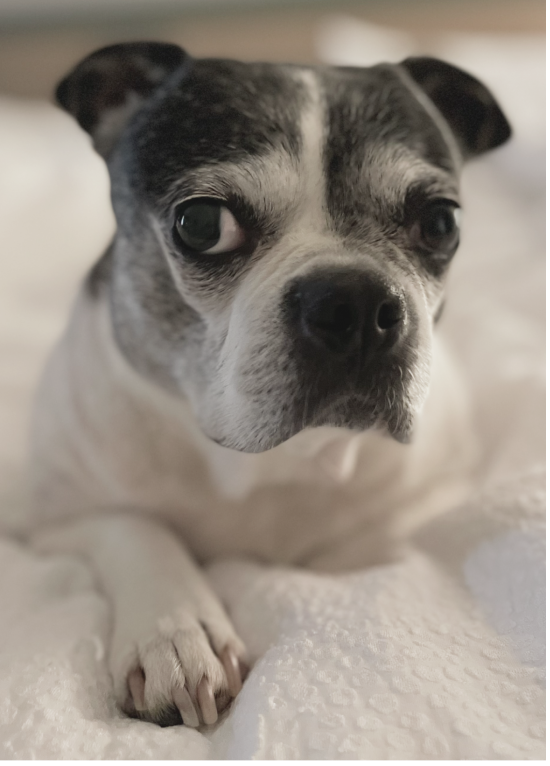TRAINING & BEHAVIOR / BEHAVIORAL HELP

Disclaimer : I am not a vet. Always consult with a qualified veterinarian for concerns about your Boston Terrier’s health.
Introduction
The gentle snuffling sounds of a sleeping Boston Terrier can be adorable. These small dogs can also produce a surprisingly robust snoring noise and it is heartwarming to know your furry friend is completely relaxed and at ease. It is also important however to ensure your Boston’s snoring is not excessive and a sign of an underlying health condition.
What This Guide Covers:
- Why Boston Terriers are prone to snoring.
- Potential health concerns associated with snoring.
- Practical tips to reduce snoring and improve their comfort.
Why It’s Important:
- Snoring may be harmless, but it can also signal underlying health issues.
Why Do Boston Terriers Snore?
Brachycephalic Breed Traits
- Boston Terriers have flat faces (brachycephalic), making them more likely to snore due to:
- Narrow nasal passages.
- Elongated soft palate.
- Smaller airways.
Sleep Position
- Some positions restrict airflow, increasing snoring.
Obesity
- Extra weight can put pressure on the airway, worsening snoring.
Allergies or Irritants
- Common triggers include:
- Dust, pollen, or mold.
- Household cleaners and perfumes.
- Cigarette smoke.
Health Concerns
- Snoring can sometimes indicate:
- Respiratory infections.
- Obstructive sleep apnea.
- Nasal polyps or other obstructions.
Should You Worry About Your Boston’s Snoring?
When Snoring Is Normal
- Occasional snoring is common and usually not a concern.
When to See a Vet
- Loud, chronic snoring accompanied by:
- Labored breathing.
- Nasal discharge.
- Lethargy or lack of appetite.
Tips to Reduce Your Boston’s Snoring
Adjust Their Sleep Environment
- Elevate Their Head: Use a small, supportive pillow to open their airways.
- Use an Air Purifier: Helps remove allergens and irritants from the air.
Maintain a Healthy Weight
- Feed a balanced diet.
- Ensure regular, moderate exercise.
Avoid Triggers
- Keep your home smoke-free.
- Minimize exposure to dust and allergens.
Try a Humidifier
- Adding moisture to the air can soothe dry nasal passages.
Sleep Position Training
- Encourage your Boston to sleep on their side instead of their back.
Long-Term Solutions
Consult Your Vet
- If snoring persists, discuss potential medical treatments, such as:
- Surgery to correct elongated soft palate.
- Medication for allergies or infections.
Dental Health Matters
- Poor dental hygiene can exacerbate snoring by causing oral inflammation.
FAQs
Is snoring more common in older Bostons?
Yes, as they age, muscle tone in their airway decreases, increasing snoring.
Can diet changes help with snoring?
A healthy diet that maintains optimal weight can reduce snoring caused by obesity.
Final Thoughts:
Occasional snoring is normal for Boston Terriers, but chronic, loud snoring may require intervention.By making small changes to their environment, health habits, and sleep routines, you can help your Boston breathe easier.

Additional Resources
Other articles by this author

“Hi! I’m Weezie, a spirited Boston Terrier / French Bulldog mix and self-proclaimed expert on everything Boston.
- Article 1
- Article 2
- Article 3